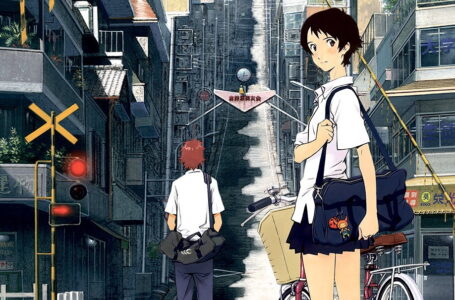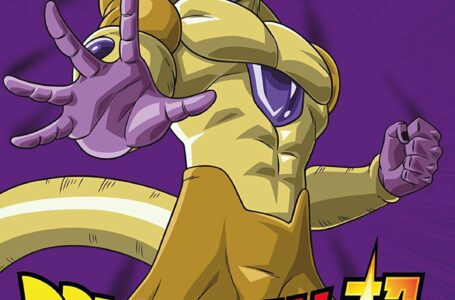The beautiful mediocrity of Belle
Just recently, Sing a Bit of Harmony was a pleasant surprise, and currently remains my favourite cinema movie of the year so far. It managed to balance a positive depiction of a future alongside artificial intelligence with comedy, romance and sci-fi, but was still emotionally grounded with its authentic and heartfelt messages. On top of all that, its unusual and refreshing approach as an anime musical made it truly unique and memorable.
And now, at least in my own location, we have also seen Belle hit our cinemas. Its official release date was around the same time as Sing a Bit of Harmony — and interestingly enough, they are similar in many ways, such as their themes and how they both feature a strong focus on significant musical numbers to progress the respective stories. But there have undoubtedly been many more eyes on Belle, both prior to and following its release.
Belle was a very exciting prospect well before it released, with it being the product of both eastern influences and Japanese media coming together to create a movie with a similar quality and budget to what we would expect from Disney movies. It even has the talent on board to back this up, with its conceptual artist Eric Wong, creator of the Internet world space “U”; character designer Jin Kim, who brought us the princesses of Disney’s Frozen; and Tomm Moore and Ross Stewart of studio Cartoon Saloon, animators from the “U” universe.
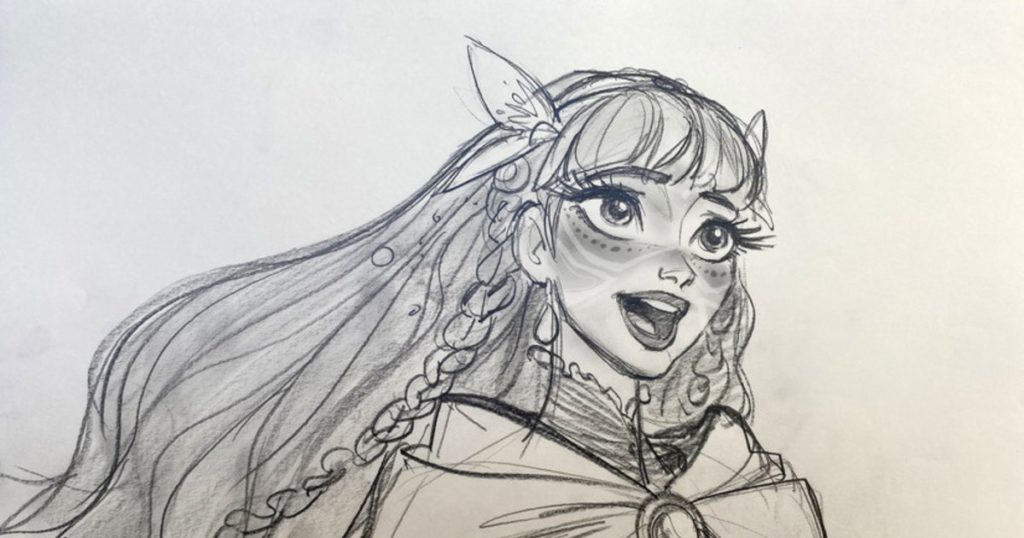
For a movie that garnered a lengthy standing ovation in the Cannes Film Festival after it was finished, my expectations were certainly high when I walked into my own screening. But after two hours spent taking in all its visual flair, stunning sound work and well-intentioned messages, I was left feeling a fair amount of disappointment. So let’s talk about that, so I can get these mixed feelings off my chest!
The best bits of Belle
Belle follows the emotional journey of Suzu, a shy and reserved student who finds herself rebuilding her confidence and starting to overcoming past trauma when she enters the online world of “U” as her avatar Bell. The primary reason she seeks escapism like this is because she becomes able to sing once more when embodying Bell. In the real world, meanwhile, she is no longer able to hold a note without crying due to said trauma she experienced years ago.
Since part of the appeal of the movie is discovering the truth behind its story, we won’t be going any further into spoiler territory other than that as a simple synopsis. Suffice to say that the movie is as much about Suzu overcoming her own trauma as it is a moral lesson to everyone about the benefits of coming together in an age of technology that links us all across the globe.
The overarching message that we should always remember to be kind to strangers — especially in a world not unlike our own — is a universal, everlasting theme worth emphasising, and it’s well implemented here as a main end point to the entire story.
As far as it being regarded as an anime musical movie, that is perhaps not an entirely accurate descriptor. There are only six vocal tracks in the OST, and two of those are reprises — meaning that there are really only four original songs in total. That doesn’t fill up much of the movie’s runtime, so much of the rest of it is quite dialogue heavy. But the musical numbers are also visually stunning moments that progress the story, and are absolutely critical to the pacing of the movie; they always act as either a turning point in or conclusion to the characters’ development.
The composition of these all-important vocal tracks is masterfully done — so much so that the praise that they get in the movie itself is more than deserved. Yûta Bandoh, Ludvig Forssell and Taisei Iwasaki make this movie a must-watch for the musically magic they’ve mustered up here.
In any case, each track is incredibly powerful. Both Kaho Nakamura as the Japanese voice and Kylie McNeill in the English dub do an incredible job at projecting Bell/Suzu’s vocals. They sound remarkably similar to one another in tone and delivery, and we could not ask for a better performance from either as they deliver the intended, heartfelt and genuine emotions of each vocal track to perfection.
Their subtle inflections help to highlight Suzu’s discomfort right up until she embraces her singing once more during the climactic finale of “A Million Miles Away”; it’s phenomenal to see Suzu gradually shed her insecurity over the song’s 8-minute runtime, depicted through her improving pitch and obviously increasing confidence.
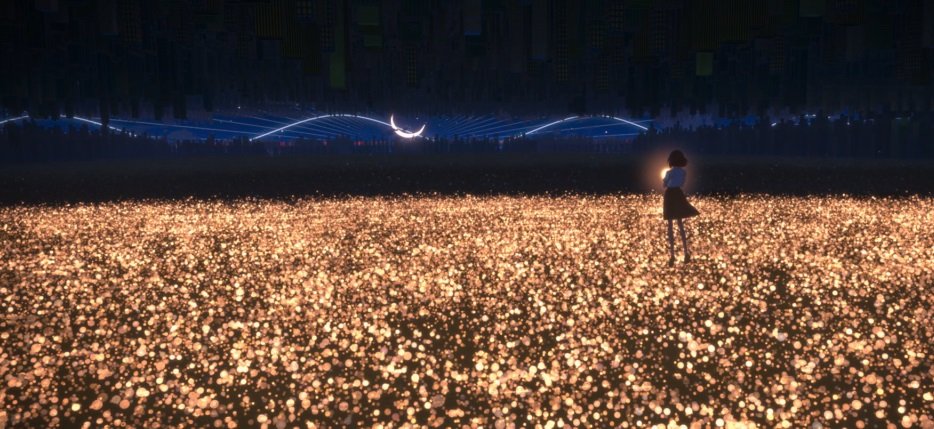
The movie’s penultimate moment sees Suzu finally able to save someone else through her singing, and this nicely concludes her growth and arc. The moment is breathtaking, and the way in which we see the other avatars’ lights fill up the universe and hear the voices crescendo into a chorus is ethereally uplifting. It indicates that everyone is uniting, all for the sake of someone they don’t know.
It’s the most positive and heartwarming moment of the movie, sending across the overarching message that the Internet can sometimes actually bring us closer together with good intentions — splendidly, and with such power!
I still get goosebumps with this song now that I’ve experienced it in the context of the whole story. The compassion of the voice actresses’ vocal talents alongside a memorable visual presentation of unity; the themes of embracing one’s identity; and the pretty visuals that capitalise on the movie’s use of flowers and other motifs in its visual language — all of this combines to mean this is the one and only scene from Belle that I think I’ll remember forever.
On a final note to compliment the movie’s high points, the romance between two supporting characters was both endearing and hilarious enough to make it my other personal highlight of the movie as a whole. It is directed wonderfully through a combination of simple charm and slapstick comedy to depict the beginnings of a high school romance.
Overall, the movie’s most significant messages were refreshing in their optimism and well-presented — and as such it’s unsurprising that most of the positive commentary on the Internet has focused on this side of things.
The disappointment felt with everything else
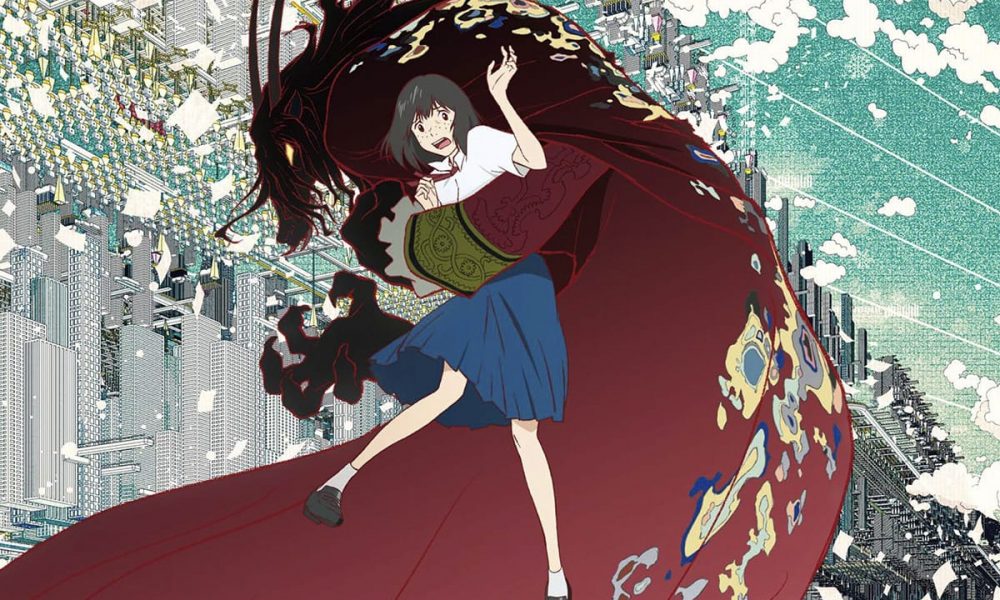
Unfortunately, my praises end there, so let’s get into the more disappointing aspects.
The movie has far too little exposition, but too frequently relies on telling rather than showing. Information dumps are plentiful, and these are made even more obvious when events seem to illogically follow from one another with bad transitions and poor plot progression.
The latter half of the movie is much better; the first half, meanwhile, is padded so much so that its plot progression feels completely muddled and weakly written. Thankfully, things do finally pick up — and substantially so by the grand finale.
But the overall setup left these key moments feeling like they didn’t get enough runtime to develop before we arrive at the eventual destination. Story beats end up coming and going at irregular intervals, with the climax of the movie concluding Suzu’s character development feeling far too sudden; it was never naturally depicted as part of the narrative, and all of her self-improvement feels like it ends up crammed into the song.
Speaking of characters in general, I can forgive anyone for failing to remember any other characters’ names other than leading lady Suzu. Secondary characters are, more often than not, one-note archetypes — with the very worst example being main love interest Shinobu, a character we’ve seen time and time again in high school anime settings as the level-headed “protector” type.
The villain — if you can even call him that — is even more disappointing. Justin has no weight to his intentions and lacks a good reason for his actions, and he is presented alongside other “villainous” characters within a vigilante group of the “U” universe for just one scene. After that, they’re thrown away, never to appear again — aside from one scene where they’re simply used to showcase the strength of the “Beast”.
While the villains were clearly intended to explore toxic Internet behaviour such as doxxing, they needed more exploration — as it stands, they mostly just felt lacklustre and throwaway. And as a result, themes such as cyberbullying and egotism come and go in a flash, giving the audience a quick note that these things are “villainous” without really adding any further discussion or depth to things. They just appear here and there in the movie.
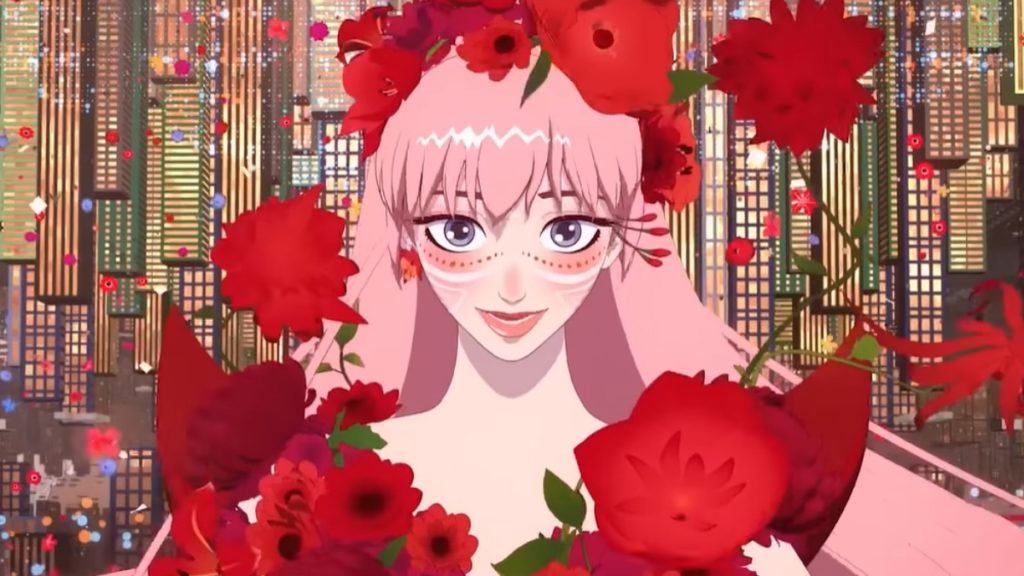
I lost count of the number of times an intriguing idea was brought up and then went absolutely nowhere; the runtime didn’t allow the movie the opportunity to explore them in any depth. Instead, it loosely and quite weakly fleshed out a few elements that supposedly deserved more attention than others — and for my money, this hurt a lot of important moments in the story.
For example, the best friend character Hiroka was completely one-note, and could have been omitted in favour of putting more emphasis on how Suzu learns to highlight her talents and market her avatar. The scenes where she helps Suzu could have been better used to emphasise Suzu’s individualism and originality in creating her own music, and in exploring her other underappreciated talents.
Likewise, Justin should have been the only villain character, since the others were all but disregarded in the movie’s online world, and by sharing the spotlight he ended up with almost no depth to his motivations. Had he been the sole antagonist, he could have been better used to explore themes such as the negative side of Internet usage, the price of fame and the doxxing mindset.
We should have also seen more of the dynamic between Suzu and her father; the movie never seems to acknowledge the pain her father would also be feeling over their shared past trauma, nor their fractured and burdened relationship.
It was a missed opportunity to add another parallel viewpoint for the story’s themes, and to act as a method of exploring different ways of coping with loss. They could have even gone as far to make him the true identity of the Beast; as it stands, the Beauty and the Beast motif feels kind of bizarre to include, and its resolution is best described as… awkward.
The romantic connotations remain intact, even if the intention was not the same, since the movie makes a point of subverting expectations. The whole situation is made even more unappealing when these characters eventually do come face to face in reality; it involves one of the most awkwardly uncharismatic and blank exchanges of dialogue I have seen in an anime movie for a while now. It should have made for a sense of emotional closure for the involved characters, but it was so poorly scripted — and felt so very, very wrong.
On that note, this all-important event would have been all the more impactful if Belle had spent much more time fleshing out the Beast’s real identity rather than presenting the Beauty and the Beast motif on a superficial level with its castle and ballroom scenes. We could have absolutely seen more of the parallels between these two main characters in terms of how they have experienced trauma and have had to learn how to cope. But one of those characters ends up living in the shadow of her own avatar.
Bell steals the show despite the story supposedly being about Suzu’s journey — and this is especially egregious during the terrific finale song. There’s definitely a sense that the wrong message is being sent somewhere along the line!
Belle’s worldbuilding and storytelling needed more attention
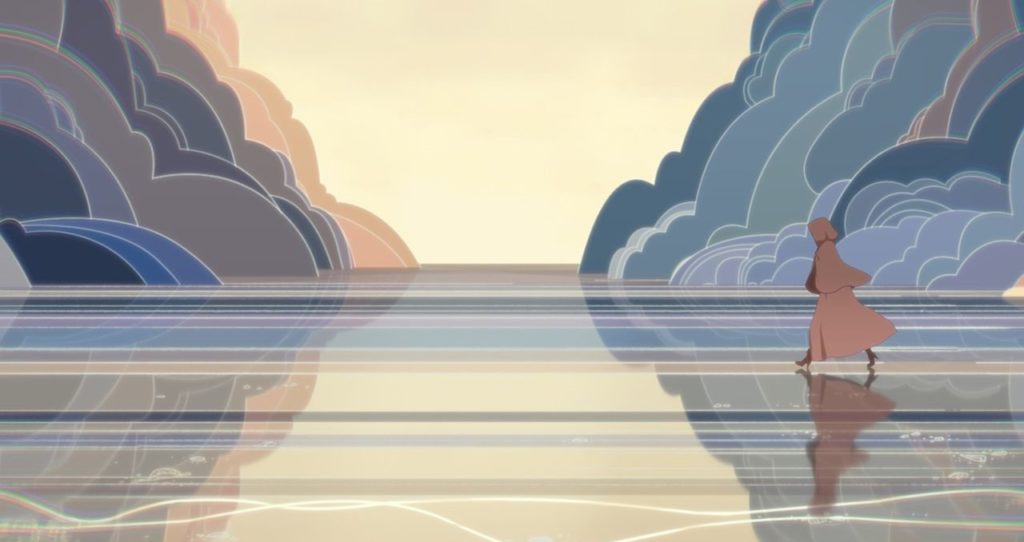
Belle’s blend of 2D and 3D visuals isn’t as consistent as in director and writer Mamoru Hosoda’s past works, and fails to hold up to even the time travel scenes in The Girl Who Leapt Through Time — and that was released back in 2006. While Eric Wong’s vision of “U” is greatly appealing and intriguing, its implementation at the hands of Cartoon Saloon leaves a lot to be desired.
Scenes set in the “U” universe are lacklustre, depicting a questionably boring environment filled with empty space and nothing to do — despite it supposedly being a place where you can be who you want to be, do what your heart desires, and change the very world of it. (Sounds like that Facebook Metaverse thing – Ed.)
If anything, it made me wonder why anyone would willingly just drift across that uneventful terrain for hours and hours at a time. We see nothing about the entertainment within the world, other than when avatar singers such as Belle perform — so the appeal of such a seemingly vastly empty world is lost on the viewer. We just have to accept what we are being told.
And rather regrettably, it even came across as an eyesore at times — noticeably during the fight scene that uses awkward animation for certain effects, and when characters suddenly become static, which is quite distracting during the movie’s climactic “A Million Miles Away” number!
This leads me onto my next issue with the movie — certain things make no sense when they are first presented, and then they are never explained; at worst, they are glossed over completely. A primary example of this is how people who are connected into the “U” universe are psychologically transported to its realm, yet there are plenty of examples in the movie that show that said characters are still existing and moving in the real world while being connected to “U”. How does that work?
An unappealing mashup of fantasy and reality
Belle sees Hosoda bringing the same themes he has explored time and time again, but this time focusing heavily on the idea of what the Internet provides humanity with — for better and worse. Every Internet denizen knows that dark places exist online, and the important thing is what you do with that information. With the freedom the Internet offers, do you still respect others, or do you spout your opinions and beliefs without any care of how they might hurt others — or without any consideration of what the consequences might be?
The movie highlights how both the Internet and relative anonymity can harm a person, as well as how “social credit” is determined by your followers. Scandals can continue to chase you through your entire life, and attempts to vent your own frustrations can fall on deaf ears. But all of these sad notes ultimately end on a positive note, with Belle’s characters looking optimistically into the future and considering what the Internet can give us when its users treat one another with kindness.
However, while these are noble intentions, the journey to that destination is anything but brilliant. Belle is bloated with ideas on top of ideas, which means none of them are explored in any worthwhile depth, and few feel substantial and significant enough to be memorable. Nothing comes close to the importance placed on Suzu finding her own sense of identity — and even that feels like it jumps around before eventually arriving at its conclusion. Ultimately, the movie is poorly paced, with questionable cuts between scenes that jumble up the timeline and continuity.
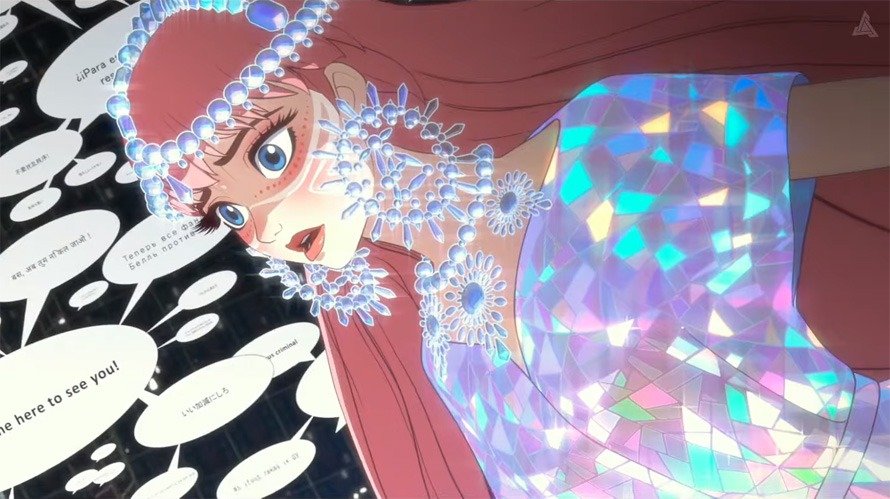
This is where I take the biggest issue with the movie. The finale is idealistic, with Suzu travelling across the country in the late evening for who knows how long. She’s alone, despite supposedly being surrounded by support, and she confronts the “big bad” in the real world, where her own life is put in jeopardy. But for the sake of the movie wrapping things up neatly, the stand-off, of course, goes her way — and it feels bizarrely tone-deaf.
But the same issue can be seen in how the movie explores the lives of the antagonist’s victims. We see no closure for them and the pain they have suffered — and during the few times we see what they have to say about their circumstances, their words are understandably laced with disdain and despair. Authority figures have failed them — and even Suzu gives them empty promises, much like every other adult they’ve encountered in their lifetime. Both points feel grossly mismatched and fail to balance realism and idealism in a situation so grounded in relatability.
At the same time, I can appreciate the main point coming across during the scene — a willingness to take action is the important lesson to take away. It does succeed in sending across the message of Suzu’s growth, however, and it helps to emphasise how Suzu is fast approaching the level of kindness that her mother taught her. It’s what we would expect by this point — and it does at least help to emphasise the persistent message that the Internet can still come together in unity for a greater cause, especially when those who really need a voice are ignored.
In closing
A lot of my complaints probably come down to the fact that Hosoda wrote Belle, as it suffers from similar issues to his previous movies that are regarded as weaker entried in his filmography — specifically Mirai and The Boy and the Beast. Ultimately, Belle is no The Girl Who Leapt Through Time, but for what it’s worth, Hosoda’s staple teachings and directing can still be thoroughly appreciated here.
It is nowhere near his finest piece of work, but in the end, Belle’s soundtrack is what makes it a worthwhile watch, even with all the above caveats. The entire OST heightens the on-screen emotions of the movie’s characters and events — and it undoubtedly would not be the same without its quality, and how it adds to the story.
Belle did not wow me, but it did warm my heart. At least its grand finale was a punch to the gut — I was happily sobbing from the emotion of it all. And that makes me believe that Hosoda still has magic to continue spreading onto our screens; I just wish that this movie would work without needing the OST to carry it quite as much as it does.
Find your local showtimes and more info on Belle via Google.
Join The Discussion
Rice Digital Discord
Rice Digital Twitter
Rice Digital Facebook
Or write us a letter for the Rice Digital Friday Letters Page by clicking here!
Disclosure: Some links in this article may be affiliate links, which means we may earn a small commission if you make a purchase after clicking on them. This is at no additional cost to you and helps support Rice Digital!
- Sigh of the Abyss: Shadow Bonds – Prologue Review - October 7, 2023
- Is She The Wolf? is wickedly addicting TV - October 6, 2023
- The steady consumption of Slow Damage - October 5, 2023




